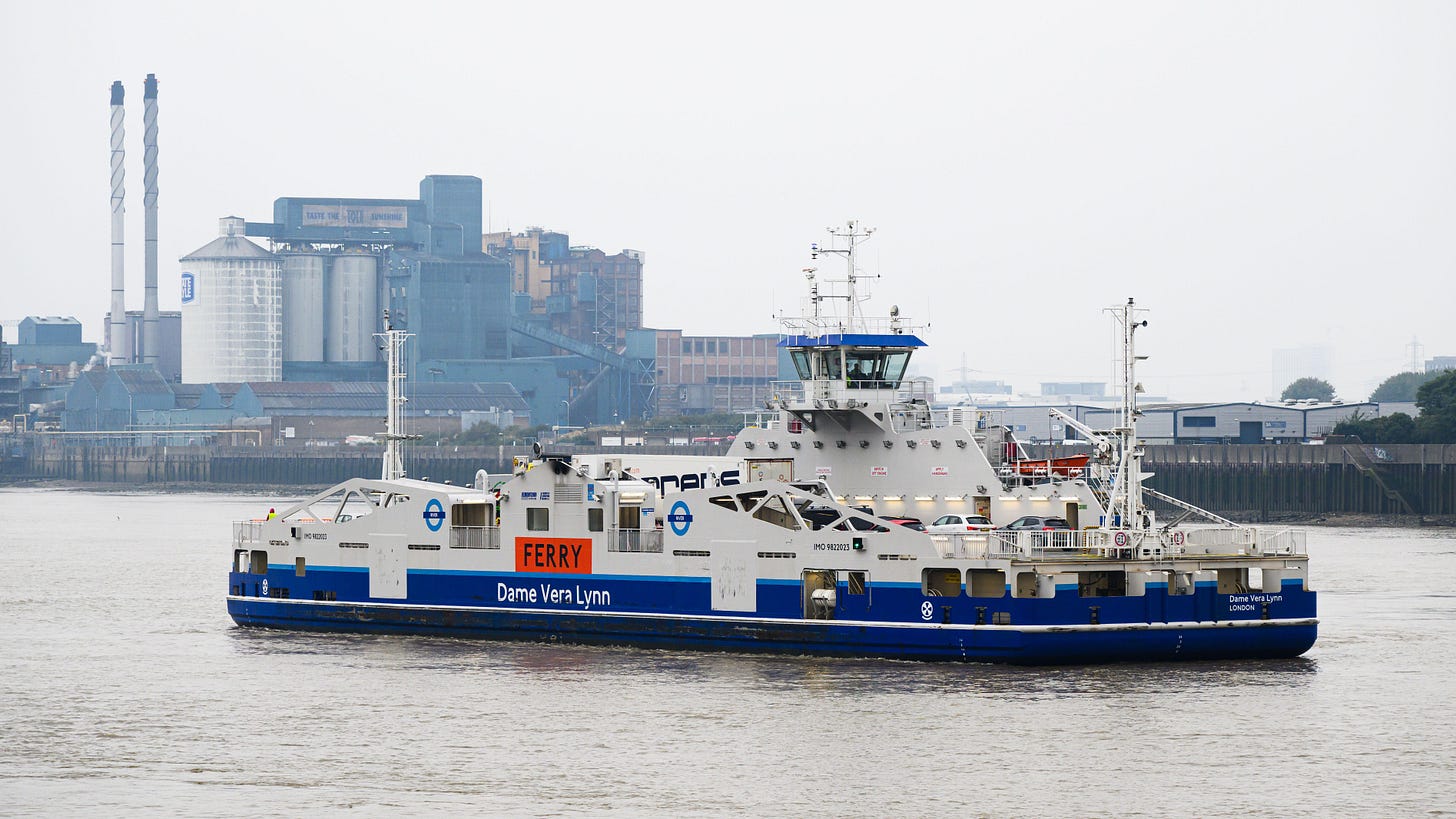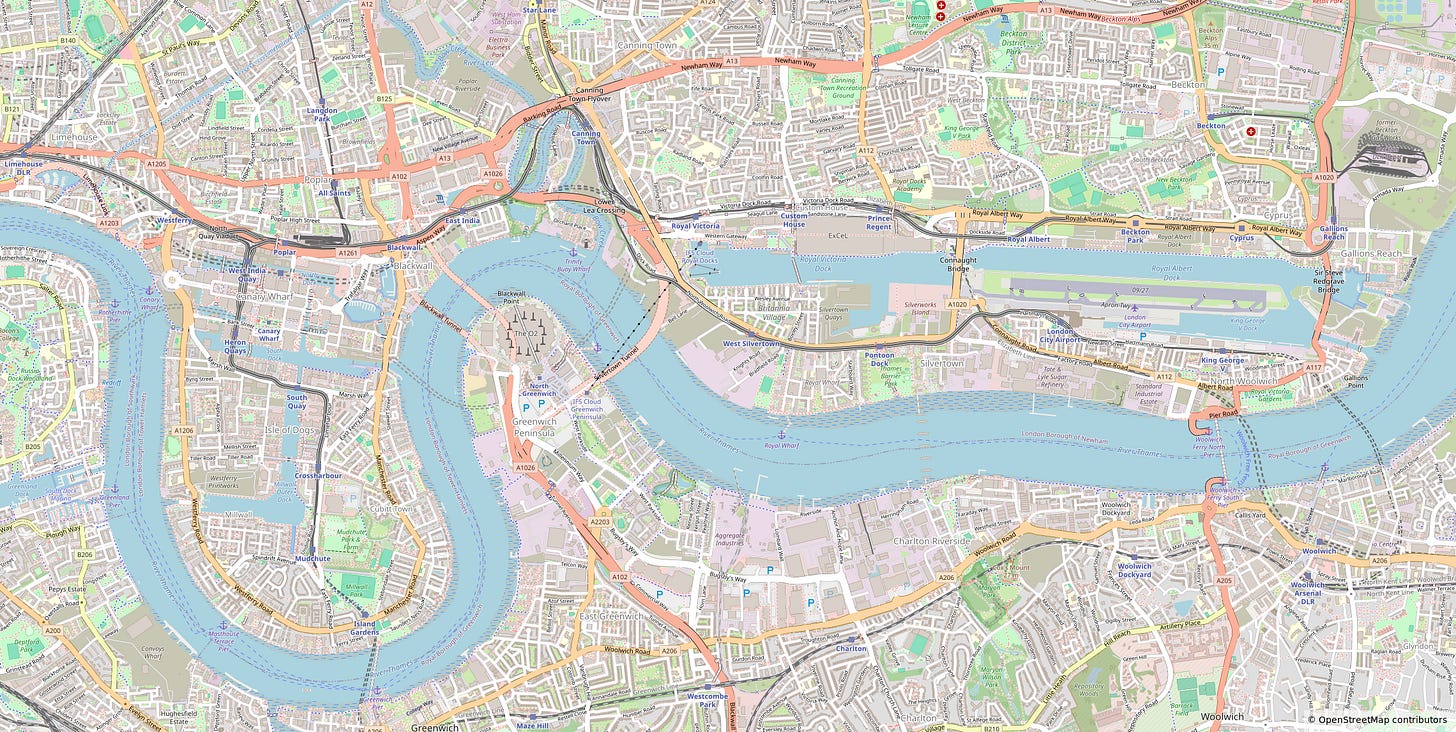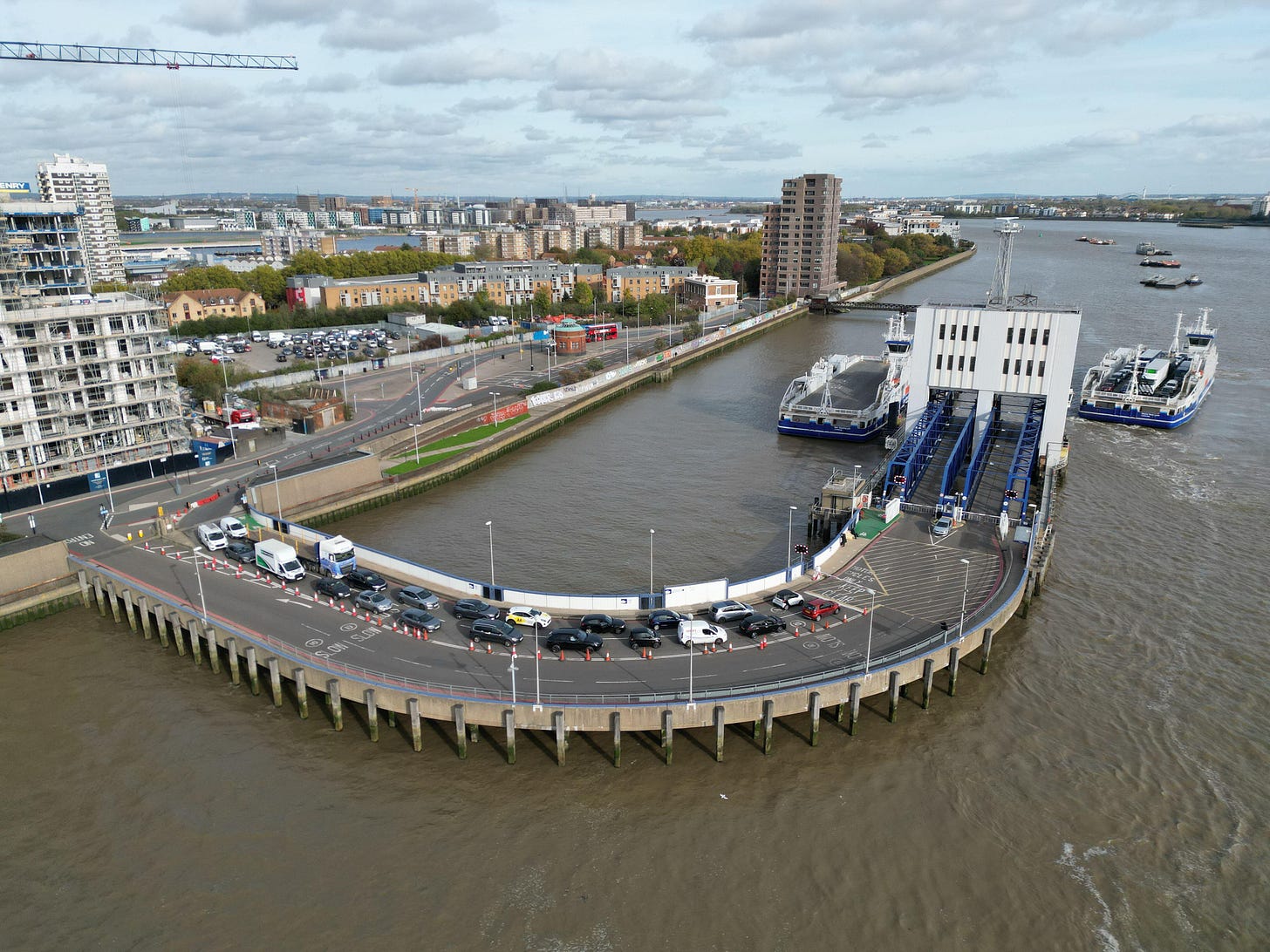The £30,000 legal challenge to Mighty Hoopla and Field Day festivals
Plus: The strange alliance of motorists using an ancient ferry to avoid the new tolls for crossing the Thames.
We want to open today’s edition with a note of thanks to our readers. When London Centric launched seven months ago, it was based on an educated gamble that London badly needed in-depth reporting and that a community of people would be willing to pay for it.
Proper journalism takes time and money – checking out tips thoroughly, making phone calls, knocking on doors, persuading people to speak, and working through legal hurdles when we are poking at people with expensive lawyers.
This week London Centric was nominated for one of the most prestigious investigative journalism awards in the industry, Private Eye’s Paul Foot award, for our work on the safety of Lime’s e-bikes. Thanks to our paying subscribers for enabling us to carry out this work.
Scroll down to read today’s main story on the battle over the future of some of London’s biggest festivals.
“I’m not sending Sadiq Khan any more money”: The curious revival of the ancient free Woolwich Ferry.
By Liv Facey

Sadiq Khan heralded last week’s opening of the tolled £2bn Silvertown Tunnel and the introduction of a crossing fee on the parallel Blackwall Tunnel as “part of the solution” for a greener, more efficient city. But London Centric has discovered that the decision to charge for the crossings is having an unexpected impact on one of the capital’s most traditional modes of transport – and causing major disruption to the Londoners who have used it for years.
An alliance of the cash-strapped, the sat-nav dependent, and those who virulently loathe the mayor of London are using the Woolwich Ferry to avoid paying the newly-introduced tolls just upriver.
Taking the boat, which carries up to 40 cars and runs every 15 minutes, can add up to an hour to journeys when queuing time is taken into account. But it also enables those making the journey to avoid the £8 return fee for driving a car through the Silvertown and Blackwall tunnels in peak hours. A lorry doing a cross-river return journey can save up to £20 by using the ferry instead of the new purpose-built crossing — HGVs carrying deliveries for Tesco were among the vehicles queuing up for the cheaper crossings.
“I’m not sending Sadiq Khan any more money,” said Adam, a construction worker queuing for the ferry when London Centric visited earlier this week. “There was no reason to toll the tunnel. He’s just looking for more ways to line his pockets.”
Eddie, who works on both sides of the river, said he can't afford to pay £4 for each crossing, so he's resigned to using the ferry: “It’s pay Sadiq Khan or go free. I’m a one-man band so this is just easier and the view’s nice.”
Khan does not personally benefit from the tolling revenue. Money from the tunnels will be used to repay the construction and maintenance costs of the Silvertown crossing, which has been privately financed. Any surplus paid by drivers will ultimately flow to Transport for London.
Local Woolwich resident Emma Parla said she used the ferry regularly until the new tunnel opened. Now she says she struggles to get on it due to increased demand: “The queue is so long, I waited an hour north to south then gave up and used the Blackwall tunnel. It will be far worse when the schools go back.”
A boat has operated across the Thames at Woolwich since at least 1308, when waterman William de Wicton was recorded to have sold the business for ten pounds. The modern Woolwich Ferry, described in parliamentary papers as being for “persons, cattle, and carriages”, has existed as a free crossing for the benefit of Londoners since 1889, connecting south London to the area of Docklands near City Airport.

There had been plans to replace the Woolwich Ferry with a bridge or tunnel upriver at Gallions Reach, which was cancelled by Khan when he was first elected in 2016. Instead, a decision was made to buy replacement vessels for the ferry. In addition to being free, the ferry has other advantages: unlike the Silvertown Tunnel, it is able to carry the rapidly-growing fleet of cargo e-bikes that service London’s home delivery networks and building sites.
One ferry worker said the crossing, which takes only five minutes once all the vehicles are loaded, had been “busier than usual considering it’s the Easter holidays” and predicted chaos when the school traffic returned next week.
The massively increased queues have hit people who have previously relied on the ferry for their commute. Rose, a nurse, said: “My patients are waiting in the surgery now. There’s nothing I can do. And when I finish work I have to pick up my child, so I have to do this again.”
Among the people who felt their time — and the cost of the extra petrol as their engines idled — was worth less than the £4 Silvertown tunnel fee were many baffled drivers who couldn’t believe they were queuing for a boat. Several said they had been directed towards the Woolwich Ferry for the first time by the ‘no tolls’ setting on Google Maps and other navigation services.
One man said he’d been waiting almost an hour for a ferry he didn’t previously know had existed. He wished his sat nav had pointed him towards the tolled tunnel instead: “I would’ve willingly paid the money. This has taken me all morning.”
A Transport for London spokesperson said they are aware that “some queuing times at the Woolwich Ferry have increased recently” and “our on-site staff are working to manage these”. The problem is that TfL, which pays millions of pounds a year to provide the ferry, would require an act of parliament to introduce a toll on the only free vehicle crossing of the Thames east of Tower Bridge that is capable of taking vehicles of all sizes.
Until that changes — or people get bored of waiting an hour for a boat — the ancient Woolwich Ferry risks undermining attempts to direct people towards the new multibillion-pound road tunnel.
(Update: This article originally erroneously and embarrassingly suggested that there was no other free road crossing east of Tower Bridge. What it meant to say was there is no other crossing able to take vehicles of all sizes. The Rotherhithe Tunnel remains free and is capable of carrying cars and small vans under the river. London Centric thanks the reader who pointed out our mistake.)
Fool’s Gold: Government asked to act on London Centric housing investigation.
Last week’s London Centric investigation into James Gold, the “dishonest” property developer using a loophole to privatise council housing blocks across the capital, has prompted calls for both the national government and local council to intervene.
Tower Hamlets Labour councillor Asma Islam has written to housing minister Matthew Pennycook. She wants the government to investigate whether London Centric has uncovered a “deeply disturbing” national scandal potentially involving “predatory practices” where people are signing up to privatise their council housing blocks without receiving independent legal advice.
Islam, who leads on housing for the Labour group in the east London borough, has also asked the Aspire-run local council to provide updates on any similar privatisation schemes and ensure “vulnerable residents are protected from undue pressure” to hand over control of their buildings.
“I am concerned about the wider implications for council tenants, leaseholders, and the future of social housing across our borough,” she wrote.
Meanwhile, property developer Henry Smith, known for evicting hundreds of people from a Deptford property just before Christmas, has been in touch with London Centric to distance himself from James Gold. The two men were in business together until 2011 but Smith has insisted that he does not want to be associated with Gold or his more recent activities in any way. We are happy to make this clear.
London Centric’s journalism is only possible with your support. If you haven’t already, please consider becoming a subscriber for 25% off and receive exclusive members-only investigations.
You can always get in touch via email or WhatsApp.
The legal battle to stop Mighty Hoopla and Field Day taking over a south London park — and the local residents who want the festivals to go ahead.
By Rachel Rees

A residents’ group in south London has crowdfunded £30,000 for a judicial review against Lambeth council’s decision to allow a series of festivals in their local park, in a legal action that could have implications for other parks across the capital.
In late March, Lambeth council approved a series of five major events in south London’s Brockwell Park in May and June, including the popular festivals Mighty Hoopla and Field Day. Last week, Protect Brockwell Park sent a pre-action letter to the council claiming that this decision was “unlawful” and warning of a potential judicial review.
Ostensibly, the battle is over how long the park is closed off to the general public. The council granted a certificate of lawful development to events company Brockwell Live, a legal procedure which enables the temporary change of use of a space without requiring planning permission for a maximum of 28 days in a year.
Brockwell Live, which organises the festivals, argues its events span 17 days. However, community group Protect Brockwell Park says that this fails to take into account the additional time that the park is fenced off during the construction and taking apart of the site, which they claim took part of the park out of action for 38 days last year. As a result they believe the festivals should legally be forced to go through the full planning permission process.
Lucy Akrill, a Protect Brockwell Park campaigner who lives nearby and uses the park every day, told London Centric that the lack of requirement for planning permission for the event meant “no scrutiny” of whether it is the best use of the area and the damage caused to the site.
“So many people within the community have just had enough with the fact that the council claims they consult with the community”, she said. “We have got to the point where it feels like legal action is one of the few ways we can make the council listen” to residents’ objections, she added.
If the legal challenge is successful, the continuation of the festivals in their current form is at stake, with the group calling for a rethink of the council’s events strategy and fewer and less frequent festivals.
“We’re not saying there should be no festivals at all,” she added, but “this is too big, too impactful”.
While the festivals themselves last just over two weeks, Akrill said that last year’s events left the park “out of use for the whole summer and a boggy mess for the whole winter”, lamenting the “huge loss of amenity as well as damage to the park”.
“I don’t want the festivals to go away.”
Not all residents agree. London Centric reader Ana De Liz got in touch over concerns that only one side of the debate was being heard. She acknowledged the group’s objections regarding the state of the park but said: “This legal action is driven by wanting the festivals to go away. And I don’t want the festivals to go away.”
She highlighted the significance of Mighty Hoopla – one of the most prominent Brockwell Park events, headlined in recent years by bands such as Steps and the Sugababes – to London’s LGBTQ+ population. “You don’t really get a lot of LGBTQ+ friendly festivals in the UK”, she explained. “We’re seeing a huge decline in venues and spaces where people are allowed to dance, have fun, make friendships, and have a nice time. People in the UK don’t get to have a nice time very often. When, frankly, retired white people are trying to take that away, it really does annoy me.”
A Lambeth Council spokesperson echoed this, saying that Lambeth’s LGBTQ+ community “really get behind the Mighty Hoopla”: “When heavy rain last year put the Mighty Hoopla in question, we were heavily lobbied to make sure it went ahead”. City Splash, another Brockwell Park festival, was “much loved by our Black communities and beyond”, they added, while the series of events helped “cross fund south London’s flagship free community festival, the Lambeth Country Show.”
Locals are also eligible for some free tickets to the paid festival events through a ballot. Leah Fahy, who lives nearby and benefitted from the scheme last year, said she sympathised with the objectors’ concerns: “I love the park and I’m there all the time. It is a little bit annoying when I can’t use it all, but it’s fine”. Nonetheless, she pointed out that the perimeter path remains open throughout the festival weeks, and the park has now fully recovered from last year’s damage.
Ultimately “someone’s going to be upset”, she said, but festivals “have got to go somewhere — people want them to happen.”
“What an extraordinarily bad deal”
The battle over whether London’s public parks should be used for big money-making private festivals has become a livewire issue across the capital. In January, Wandsworth council withdrew applications to hold commercial events across Wandsworth Common, Tooting Common and King George’s Park after opposition from residents. Other battles have been fought over Finsbury Park in north London.
Part of the issue is that renting out parks is a way for cash-poor councils to raise money after almost two decades of austerity.
Local authorities refrain from publishing specific details of the income generated by these events on commercial grounds, but Tower Hamlets council – the local authority in charge of Victoria Park, the venue for All Points East festival – outlined a target income of £1.6m from “commercial event activity in parks and open spaces” in its 2023/24 budget. “This is likely to increase in future years,” they added.
Lambeth council told London Centric it did not declare the rent paid by Brockwell Live but said the deal brought in £125,000 for the borough’s parks, £100,000 of which is ringfenced for Brockwell Park itself – a fifth of the council’s annual spending on the area. In addition, Brockwell Live running the free community festival the Lambeth Country Show — known for its curiously carved vegetables — saved the council £700,000 last year, they said.
Nonetheless, the events companies are the real winners, said Protect Brockwell Park’s Akrill, with many councils limited on how much money they can raise through parks that are often held in trust. “Huge amounts of money are being made” by the operators, she said. “What we feel as a community is: ‘what an extraordinarily bad deal’.”
The Brockwell Park festivals such as Mighty Hoopla, Cross the Tracks and Field Day are part-owned by Superstruct Entertainment, ultimately controlled by a company registered in the tax efficient jurisdiction of Luxembourg. Superstruct was in turn recently part-purchased by private equity business KKR in a €1.3bn (£1.1bn) deal, which has prompted a boycott of Mighty Hoopla by some musicians who object to the financial firm’s investments in Israel.
The “narrative of freedom and free-spiritedness around festivals” is at odds with “the amount of money being made out of them”, declared Akrill. “They have become very monetised, very fenced off, very inaccessible”.
De Liz, the local resident who supports the festivals, also expressed her concern at profits from Brockwell Park events potentially going to an offshore company. Nonetheless, she said festivals are a big part of London summer: “Losing more would make London a very boring city.”
Did you appreciate this edition of London Centric? Please forward it to a friend, post it on social media, get in touch via email or WhatsApp, or leave a comment.








I think the point about the bad deal is important. I wouldn't object to Wireless Festival in Finsbury Park if I thought the council were really squeezing the operators for money, but summer events in Finsbury Park turn over somewhere around £40 million a year of which the council only takes £1.2 million to put back into the park. Local council committees aren't any more capable of negotiating effectively with big festival operators than they are with big property developers. In the future, when all the councils are stripped of their powers in the way that London Centric commenters hope and pray for, these things should be negotiated centrally so that the festival operators can't shop around so easily.
I'm glad you gave a voice to someone other than the NIMBYs. These festivals are great.